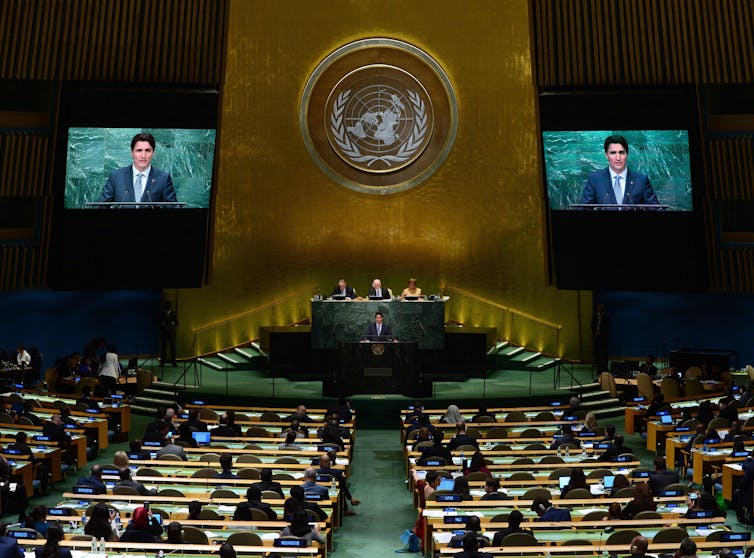Rhetoric Check: Is the election really key to Canada’s post-pandemic future?

-
The Liberals claim that a federal election is needed to allow Canadians to decide which party has the best plan to lead Canada in a post-pandemic environment. The implicit assumption is that the state of affairs pre-pandemic was a state of normalcy and the disruptions caused by COVID-19 shook up the status quo.
However, as we and our colleagues demonstrate in our book, Political Turmoil in a Tumultuous World, pre-pandemic Canada was marked by considerable turmoil and disunity. This was reflected in the 2019 election. The governing Liberals were reduced to a minority while receiving fewer votes than the Conservative Party. The pandemic has amplified these tensions; it did not produce them.
For example, Justin Trudeau has struggled to promote reconciliation with Indigenous Peoples, which has been undermined by his government’s support of pipelines while claiming to acknowledge Indigenous sovereignty and fight climate change.
The Trudeau government’s aspiration to be a feminist one was challenged by issues like the SNC-Lavalin scandal and continuing the sale of military equipment to Saudi Arabia. Relations with some provinces were also tense.
Written by academics, edited by journalists, backed by evidence.
The rise of the Black Lives Matter movement, along with the pandemic, yet again revealed the entrenched racialized and gendered nature of Canadian socioeconomic inequality.
Read more: How racism works and shifts during the COVID-19 pandemic
Continued Stephen Harper policies
Trudeau claimed that Canada was back on the world stage, and his government employed a rhetoric of liberal internationalism to distinguish it from the Harper Conservatives. However, we have argued that Canada under Trudeau has actually continued the trajectory of Harper’s foreign policy. It adopted a hard power outlook, marked by increasing subservience to the United States, to protect its dependent economic relationship, as seen in a renegotiated NAFTA.
Read more: The winners and losers in the new NAFTA
Since 9/11, security trumps trade for the Americans. This explains Canada’s China-U.S. conundrum, highlighted by the American extradition case that led to the imprisonment of two Canadians in China known as “the two Michaels.”
While Trudeau’s celebrity brand has been considerably informed by international affairs, the follow-through has been less than overwhelming. Trudeau put Canada forward for a seat on the United Nations Security Council. It was hoped that Canada’s record on issues important for member countries, namely peacekeeping and humanitarian assistance, would help. However, the fact that they suffered under his leadership led to an embarrassing defeat.

On the two Michaels, Trudeau has stated that Canada must respect the rule of law when it comes to returning Huawei’s Meng Wanzhou to China. Assurances by former ministers and diplomats that the government would be well within its rights to end the extradition process and allow her to go back were ignored. Meanwhile, the Trudeau government was seemingly less respectful of the rule of law in the SNC-Lavalin scandal.
Read more: SNC-Lavalin & the need for fresh thinking around independence and interference
With the retirement of Germany’s Angela Merkel, many pundits note that Trudeau is positioning himself as the “dean” of the G7. However, this move seems rooted in domestic political ambition more than any real leadership capability.
Now, with the turmoil in Afghanistan and in the heat of a tight election campaign, Trudeau has undercut his foreign affairs minister by adopting a hard line consistent with the American position. This seems aimed at avoiding criticism from his opponents on the campaign trail over his government’s handling of the evacuation of Canadians and Afghans who assisted Canada.
Pulling votes from the NDP
The Liberals have, over two successive elections, recast their brand to pull votes from the Conservatives, and especially the NDP. The Liberal election strategy of drawing attention to differences between the Conservatives and Liberals on health care is an example.
Read more: Canadian election 2021: Do strategic voting campaigns actually work?
But it also points to Liberal hypocrisy, given that the pandemic allowed the Liberals to drastically redraw and curtail Canada’s immigration and refugee initiatives, making health not only a security issue but an immigration issue as well.
Polls and pundits reveal increasing fatigue with Trudeau’s rhetoric-reality gaps. His government seems long on rhetoric and short on action, providing new opportunities for the opposition. The NDP has captured this sentiment with its “All Talk” attack ads against Trudeau. But can the New Democrats or the Conservatives offer something significantly different? Not likely.
Rather, the battle is to control and redefine the centre of the political spectrum. The major parties seek to distinguish themselves by politically recalibrating Canada’s identity and its role in the world, as we argue in the conclusion to our book Canada, Nation Branding and Domestic Politics. This means that despite rhetorical flourishes and zigs and zags with respect to the charged global environment, the broad trajectory of Canadian foreign policy is unlikely to change, regardless of who wins on Sept. 20.


No comments:
Post a Comment
Note: only a member of this blog may post a comment.